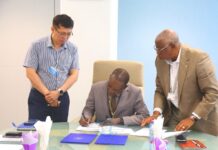The European Union Ghana Agriculture Programme (EUGAP) is firmly committed to increasing agricultural incomes and promoting inclusive and sustainable economic growth in rural communities in the north-west, the Inclusive Business Models Expert (IBM) at GIZ-MOAP, Mr. Reuben Binpori, has noted.
Speaking at this year’s Pre-harvest Agribusiness Conference and Exhibitions, annually organised by Agrihouse Foundation in Tamale, Mr. Binpori revealed EUGAP is the biggest EU-funded intervention in the country’s agricultural sector, emphasising that through its three interconnected components, the European Union seeks to support productive investments for agricultural development. “The Market-Oriented Agricultural Programme in North-West Ghana (MOAP—NW) and the Resilience against Climate Change (REACH) components, implemented by GIZ and the Ministry of Food and Agriculture, work with actors along 7 agricultural value chains,” he said.
He noted that the EUGAP has been a key partner to the Pre-harvest event since 2019, mainly as a sponsor; and in the area of exhibition, he revealed: “MOAP-NW and REACH have been heavily involved in the exhibitions and conference sessions, providing insights into the discussions. TECAS, an organisation set up through MOAP-NW and REACH to provide mechanisation services for the promotion of conservation agriculture in the Savannahs, has also been instrumental during the field demonstrations”. According to him, participating SMEs supported by EUGAP attest to the business linkages Pre-harvest provides them annually.
Impacts of the European Union Ghana Agriculture Programme
In his brief remarks at the opening ceremony of the three-day event, Mr. Binpori noted that since 2017, the capacities of over 70,000 farmers, agro-inputs dealers and agro-processors have been built to enhance improvement in the sector, which in turn has amplified the need for market systems. To this end, MOAP-NW facilitates certifications and market linkages as well as promotes integrated business models. It also supports the public sector to build an enabling framework for value chain development and an effective quality inspection system.
“As development partners of Ghana’s agricultural sector, we believe in building strong, competitive and sustainable platforms to connect the unconnected value chains that currently exist. Through such platforms, we can attain higher quality and quantity of farm produce that reaches markets to ensure our collective food security, and improved access to capital for smallholder farmers and other value chain actors,” he stressed.
He noted that MOAP-NW and REACH continue to support its partners with resources and practical knowledge that empower them to contribute to promote and adopt smart climate and good agricultural practices. Furthermore, several initiatives rolled out by EUGAP through the MOAP-NW and REACH component project continue to make impacts in the following way:
Sorghum producers in NW Ghana are linked to Guinness Ghana. Jirapa –based AE Farms, with support from MOAP-NW, sources from over 900 outgrower farmers and is currently supplying around 200 MT of Kapala variety sorghum to Guinness Ghana PLC. As with many other aggregators supported through the MOAP-NW Inputs Fund, this enables a conducive market system operation. Altogether, over 8,000 smallholders are linked to such markets annually.
The Wa West Organic Groundnut producers, certified organic and linked to export organic markets, are supplying ‘Obolo’ organic groundnut to buyers in Switzerland and Germany for a premium price that is 70 percent more than can be achieved in Ghana.
Cashew farmers in North Gonja are being supported to improve production through the integration of bee-keeping in cashew orchards and training toward organic certification, so that they can be linked to more lucrative organic cashew export markets.
The planning processes at the district levels to ensure that issues of climate change and consequently food security are featured in the district and national Medium Term Development Plans (MTDPs). The project has so far supported the development of 2022 – 2025 MTDPs in 13 districts, and the national Community Action Planning (CAP) guideline to bring some uniformity into the development of MTDPs.
A consolidated CA manual is to feed into the curricula of Agriculture Colleges across Ghana. This will help to streamline the teaching of the concept in these institutions to ensure that extension services are reflective of the evolving Agriculture in the context of climate change.
In line with the theme for this year’s event, ‘Connecting the Unconnected: The Farmer, the Market, and the Boyer’, Mr. Reuben Binpori noted that the EUGAP has scaled up a number of innovations with some private sector partners to promote an inclusive agribusiness development within the in value chain. For example, in the areas of accessing finance and agro-inputs, the two EUGAP component projects promote the VSLA approach, Matching Grant Scheme and Inputs Revolving Fund to enhance the protractive capacity of producers. Over 8,000 smallholder farmers and more than 30 off-takes benefit from these platforms annually from MOAP-NW.
He said the agri-food system is also given a boost through the promotion of sustainability certification schemes that offer farmers and other actors higher returns, such as EU Organic, Global GAP, and Ghana Green Label. Currently, over 100 farmers are exporting EU-certified organic groundnuts to the EU and Swiss market.
“Stemming from our strong belief in these market platforms, we are working together with the Upper West Regional Chamber of Commerce to put up a digital marketing platform, ‘Made in Northern Ghana’, to connect producers, aggregators and processors in the north of Ghana with buyers all over the country and beyond,” he revealed.
Key sessions at 12th Pre-harvest Agribusiness Conference
The Pre-harvest event was initiated under phase 1 of the USAID’s ADVANCE project in 2011 as a market linkage activity linking farmers to buyers. Activities at the Pre-harvest event comprises commodity breakout sessions, training sessions, panel discussions, field demonstrations and exhibitions. The event has since grown to become the leading market linkage platform in the country, and has also lived up to it overall goal of creating markets and linking farmers to buyers. Through monitoring and evaluation, it is estimated that over US$5billion of businesses has been generated over the years through the event.
In the past 11 years, the Pre-harvest event has brought together over 100, 000 value chain actors and stakeholders, among whom are farmer groups, buyers, development partners, policy-makers, agribusinesses, ICT experts and aggregators. Others include input dealers, equipment and machinery dealers, transporters, financial institutions, telecommunication companies, out-growers, civil society and processors. Farmer-based organisations have been linked to aggregators and WFP-assisted industrial agro-processors who have purchased 14,000 MT of soybean and 31,000 MT of maize from the farmers. The event has become a leading facilitator in the area of finance, fertilizer, seed, production, machinery, climate-smart agriculture, and technology for agricultural organisations. For instance, report on the 2019 event showed that about 70 business deals were made during the exhibition. More than GH¢32,420,745 worth of produce were sold and bought. This year, over 3000 stakeholders participated in the 3-day sessions, which created markets and linked farmers to buyers through:
Exhibitions: This year’s exhibitions hosted 154 agribusinesses, including farmer groups, input and seed dealers, agric marketing experts, financial institutions, brand specialists, policy-makers and influencers, transporters, equipment and machinery companies, marketers, processing and packaging companies, development partners, donor agencies, corporate institutions, aggregators, buyers, civil society, key government ministries and agencies, industry and business leaders.
Farmer to buyer matchmaking: The session was a big highlight of the event as it has been over the years. Farmer groups promoted and negotiated for pricing with buyers, and signed contracts for produce supply. Last year, 53 contracts, valued at US$189,000, were signed. Some of the farmer groups who participated in this session this year included Gushegu OB Network, Tamale OB Network, Beinmoni Outgrower Business (OB) NETWORK, Jirapa OB Network, Sissala Area OB Network, Nawuni OB Network, etc. The session connected buyers and aggregators to farmers who produce rice, maize, millet, sorghum, soyabeans, groundnut, yam and tubers, among others.
Training & capacity-building sessions: In sizable groups that enable easy interaction and flow of information, the farmers were taken through topics that increased their knowledge and skills as farmers. Organisations that led this year’s sessions included ADB, YARA, GIZ, and Ecobank, with topics such as preparing for expected demands, expected production and price expectations. The session educated participants on market demands for commodities, the need to farm with a market or financial consumer in mind, and identifying market before production. Facilitators walked participants through the entire agric value chain and how they can essentially improve each point along the chain. The purpose of these topics was to empower them to influence production, and positively influence their price expectations in the market.
Farmer-to-farmer apprenticeship programme: the 10-acre agri-village played host to the series of technical training and demonstration sessions that were held for the FBO leaders, farm associations, and outgrowers of rice, soybean, sorghum, maize and vegetables. Yara Ghana, CWoerman Ghana Limited, Agripower, Demeter, Lamb Father Engineering and SAYeTECH were companies that participated in the sessions this year. The apprenticeship training module provided experienced field representatives the opportunity to run practical and demonstrative training sessions. Through this module, the capacities and knowledge of both local and commercial farmers were strengthened and develop to practically enable them to embrace and manage machines, equipment and agri farm inputs and produce.










